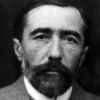Joseph Conrad

Joseph Conrad
Joseph Conradwas a Polish-British writer regarded as one of the greatest novelists to write in the English language. He joined the British merchant marine in 1878, and was granted British nationality in 1886. Though he did not speak English fluently until he was in his twenties, he was a master prose stylist who brought a non-English sensibility into English literature. He wrote stories and novels, many with a nautical setting, that depict trials of the human spirit in the midst...
NationalityPolish
ProfessionNovelist
Date of Birth3 December 1857
CountryPoland
Words, as is well known, are the great foes of reality. I have been for many years a teacher of languages. It is an occupation which at length becomes fatal to whatever share of imagination, observation, and insight an ordinary person may be heir to. To a teacher of languages there comes a time when the world is but a place of many words and man appears a mere talking animal not much more wonderful than a parrot.
The Nellie, a cruising yawl, swung to her anchor without a flutter of the sails, and was at rest. The flood had made, the wind was nearly calm, and being bound down the river, the only thing for it was to come and wait for the turn of the tide.
The real significance of crime is in its being a breach of faith with the community of mankind.
It is not Justice the servant of men, but accident, hazard, Fortune-the ally of patient Time-that holds an even and scrupulous balance.
Let them think what they liked, but I didn't mean to drown myself. I meant to swim till I sank -- but that's not the same thing.
There is no credulity so eager and blind as the credulity of covetousness, which, in its universal extent, measures the moral misery and the intellectual destitution of mankind.
I can't imagine a human being so hard up for something to do as to quarrel with me.
Lights of ships moved in the fairway-a great stir of lights going up and going down. And farther west on the upper reaches the place of the monstrous town was still marked ominously on the sky, a brooding gloom in sunshine, a lurid glare under the stars.
A certain simplicity of thought is common to serene souls at both ends of the social scale.
For a bag of pepper, they could cut each other's throats without hesitation, and would forswear their souls... The bizarre obstinacy of that desire made them defy death in a thousand shapes; the unknown seas, the loathsome diseases; wounds, captivity, hunger, pestilence and despair. It made them great! By heavens! It made them heroic; and it made them pathetic, too, in their craving for trade with the inflexible death levying its toll on young and old
The sea never changes and its works, for all the talks of men, are wrapped in mystery.
There is a kind way of assisting our fellow-creatures which is enough to break their hearts while it saves their outer envelope.
Danger lies in the writer becoming the victim of his own exaggeration, losing the exact notion of sincerity, and in the end coming to despise truth itself as something too cold, too blunt for his purpose -- as, in fact, not good enough for his insistent emotion. From laughter and tears the descent is easy to sniveling and giggles.
For all that has been said of the love that certain natures (on shore) have professed for it, for all the celebrations it has been the object of in prose and song, the sea has never been friendly to man. At most it has been the accomplice of human restlessness.